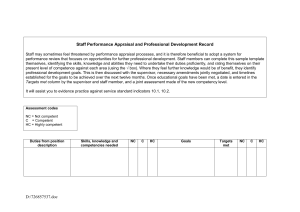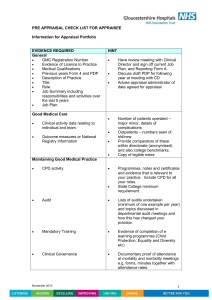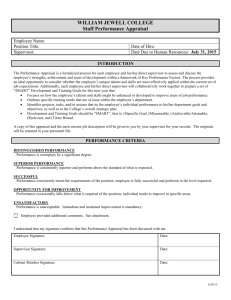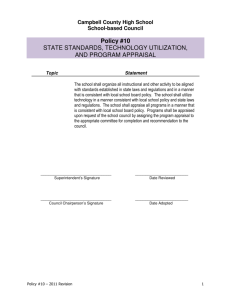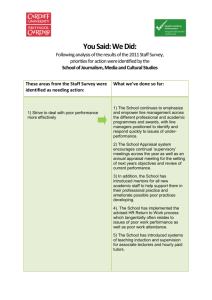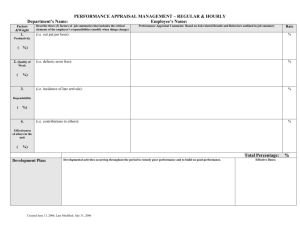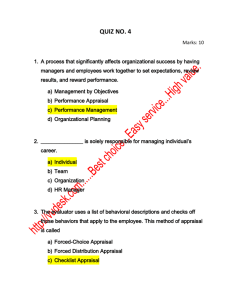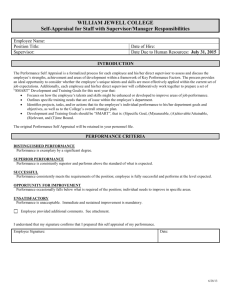Employee Performance Appraisal Form
advertisement
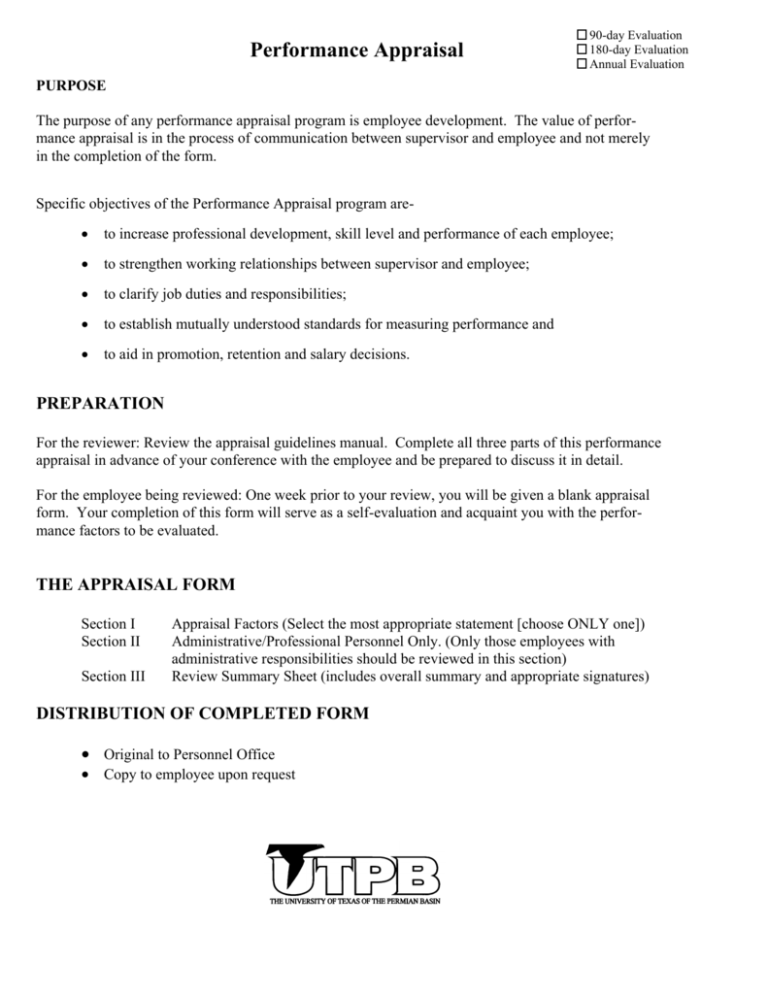
Performance Appraisal 90-day Evaluation 180-day Evaluation Annual Evaluation PURPOSE The purpose of any performance appraisal program is employee development. The value of performance appraisal is in the process of communication between supervisor and employee and not merely in the completion of the form. Specific objectives of the Performance Appraisal program are to increase professional development, skill level and performance of each employee; to strengthen working relationships between supervisor and employee; to clarify job duties and responsibilities; to establish mutually understood standards for measuring performance and to aid in promotion, retention and salary decisions. PREPARATION For the reviewer: Review the appraisal guidelines manual. Complete all three parts of this performance appraisal in advance of your conference with the employee and be prepared to discuss it in detail. For the employee being reviewed: One week prior to your review, you will be given a blank appraisal form. Your completion of this form will serve as a self-evaluation and acquaint you with the performance factors to be evaluated. THE APPRAISAL FORM Section I Section II Section III Appraisal Factors (Select the most appropriate statement [choose ONLY one]) Administrative/Professional Personnel Only. (Only those employees with administrative responsibilities should be reviewed in this section) Review Summary Sheet (includes overall summary and appropriate signatures) DISTRIBUTION OF COMPLETED FORM Original to Personnel Office Copy to employee upon request EMPLOYEE NAME JOB TITLE DEPARTMENT/SCHOOL/COLLEGE EVALUATION PERIOD: TO: FROM: I. APPRAISAL FACTORS A. JOB KNOWLEDGE (knowledge of duties and responsibilities of position) Unable to complete job duties, poor understanding of job Lacks knowledge of some phases of work Has adequate grasp of job requirements, able to learn new aspects of job Understands all phases of work, most job duties mastered Has completely mastered job, strives to learn more/improve job skills Observations: B. QUALITY (correctness, completeness, and accuracy of work duties performed) Requires minimum of supervision, consistently thorough and accurate Requires little supervision, is exact and precise most of the time, seldom makes errors Usually accurate, makes minimum number of mistakes Makes above average number of errors, final product often needs revision or correction Makes frequent and recurrent errors Observations: C. QUANTITY OF WORK (amount of work done during workday) Minimum requirements not met, volume of work generally unsatisfactory Volume of work is generally below what is expected, does just enough to get by Volume of work meets job requirements; when situation requires, production increases Volume of work frequently above that expected Produces consistently high volume of work, extremely productive and fast Observations: D. RESPONSIBILITY AND DEPENDABILITY (willingness to take on assignments and be held accountable) Requires minimum of supervision; seeks additional responsibility; is very reliable Reliable, requires little supervision, carries through effectively Usually takes care of necessary tasks and completes them with reasonable promptness Frequently requires prompting, often fails to meet deadlines Unreliable, requires close supervision, does not accept responsibility Observations: E. ATTENDANCE AND PUNCTUALITY (conformity to work hours; timely attendance at meetings) Absent often, frequently late, chronic offender Lax in attendance or reporting time, allows personal factors to interfere Usually present and on time, generally reliable Very prompt, shows responsibility toward regular attendance Superior attendance and promptness, always dependable Observations: F. INTERPERSONAL RELATIONS (communication and cooperation with fellow employees) Goes out of way to promote good interpersonal relations, very cooperative Effectively handles difficult interpersonal relations Adapts self to others and to most situations, seeks guidance when needed, user friendly Sometimes rigid and defensive, does not foster good working environment Fails to consider others, not courteous, lacks understanding Observations: G. EFFECTIVE USE OF TIME (ability to organize, prioritize and schedule) Ineffective in routine tasks, cannot plan or schedule Difficulty in determining priority and schedule of duties Completes assignments within time expected, meets schedules Plans skillfully, handles unusual situations Extremely capable in coordinating tasks in changing situations Observations: H. INITIATIVE (origination and development of vital job procedures) Develops new ideas and methods to improve quality of results Seeks additional knowledge pertaining to job Follows formal instructions as necessary Shows little interest in current practices relating to job Unwilling to demonstrate interest in gaining new knowledge Observations: I. INTERNAL CONTROL (performance as related to individual's internal control responsibilities) Has a minimum understanding of internal control procedures Internal control practices are somewhat below normal expectations Has an adequate knowledge of internal control practices and procedures Internal control practices and procedures are frequently above those expected Has completely mastered internal control policies and procedures for department Observations: II: COMPLETE FOR ADMINISTRATIVE/PROFESSIONAL PERSONNEL ONLY INSTRUCTIONS: Listed below are five performance appraisal factors which are considered representative of positions requiring administrative/professional responsibility. A brief description is provided for each factor. In the space provided, the reviewer should place words or phrases that most appropriately describe the employee's ability to perform the administrative/professional function. A. LEADERSHIP Consider the ability to motivate subordinates and co-workers, to foster high morale and to function consistently and effectively in an objective and rational manner. B. COMMUNICATION SKILLS Consider the ability to keep you informed and to communicate (both written and verbal) effectively with peers, subordinates and supervisor. C. DECISION MAKING Consider the ability to identify problems, gather and organize facts, evaluate, and make an effective final decision. Examine the ability to prepare and administer budget effectively. D. STAFF DEVELOPMENT Consider how well the supervisor selects, trains and effectively develops subordinates. Also consider how well responsibility and authority are delegated to employees in assigning job duties and objectively appraising work performance. E. PLANNING AND IMPLEMENTATION Consider the ability to plan in advance, to utilize resources (e.g., time, money, facilities, materials, equipment, employees' skills, etc.) and to accomplish objectives, meeting all deadline dates. III. REVIEW SUMMARY SHEET Performance Strengths: Areas for Improvement: Overall Evaluation (check one and/or provide written summary of performance in space below) Performance is superior, far above what is required. Employee consistently exceeds highest standards. Performance is consistently above normal expectations and standards. Excels when compared to others performing the same job. Performance is consistent with what is expected and considered acceptable. Referred to as "doing a good job." Understands and demonstrates basic principles, techniques and procedures necessary for efficient job performance. Performance is generally below the minimum requirements for the job. Performance does not meet minimum job requirements. Lack of improvement may result in disciplinary action. UNIVERSITY COMPLIANCE TRAINING COMPLETED Yes No MUTUALLY UNDERSTOOD GOALS: EMPLOYEE COMMENTS: Employee is encouraged to send written comments concerning the evaluation process to the Director of Personnel. Specific comments regarding evaluation of performance, goal setting, and plans for improving performance would be most helpful. I, the supervisor of the employee, certify by my signature below that the contents of this performance appraisal have been discussed with the employee. Supervisor’s signature: Date: Employee’s signature: Date:
